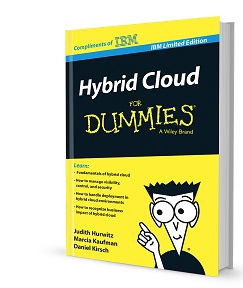Hybrid clouds are becoming the primary and pragmatic approach to leveraging a variety of cloud services that include public, private, and managed services. Increasingly businesses are thinking about the cloud as the way they can implement changes in both their technology platforms and their approach to business. Changing the way business services are delivered to customers requires that technology be available to facilitate that change.
The hybrid cloud means choice. You have the capability to use the right type of cloud service to support the right workloads at the right time. The benefit of the hybrid cloud is that it can be used to provide a set of well?managed services. These services include the capability to use self?service infrastructure services that can provide the scalability that you need for unanticipated opportunities. In addition, a hybrid cloud provides a continuous delivery platform for building, deploying, and managing applications.
Through the adoption of emerging technologies, such as OpenStack and containers, you can achieve portability of both data and applications. With the use of sophisticated cloud applications, you gain the right services to efficiently and effectively deploy the applications your users and customers need.
The hybrid cloud model provides for the combination of systems of engagement (like mobile) with systems of record. For example, one company may use its data center to manage customer transactions. Those transactions are then connected with a public cloud where the company has created a web?based, front?end, and a mobile interface to allow customers to buy products online. The same company may use a third?party managed service that checks credit for anyone paying on an installment plan. There may also be a series of public cloud?based applications that control customer service details. In addition, the company may need to use extra compute capabilities from a public cloud provider during peak holiday periods. In addition, many companies will use a public cloud to experiment with prototype business models.
The hybrid cloud is becoming the optimum approach to computing for companies that need to quickly change processes along with their requirements for compute, networking, and storage. For example, you may want to create a new mobile application that satisfies customer demands for access from any device. Customers want their suppliers to allow them to interact in their preferred deployment model. This point is especially important because emerging competitors typically provide a level of intimacy and accessibility to their solutions.
__________________________
The above is an excerpt taken from the eBook, “Hybrid Cloud for Dummies.” Click here to download your free copy to read more. Tell them Flagship sent you!
For more information about how Flagship can assist you with your hybrid cloud solution, contact us at (561) 208-FYI1 (3941).
Stay connected online:

